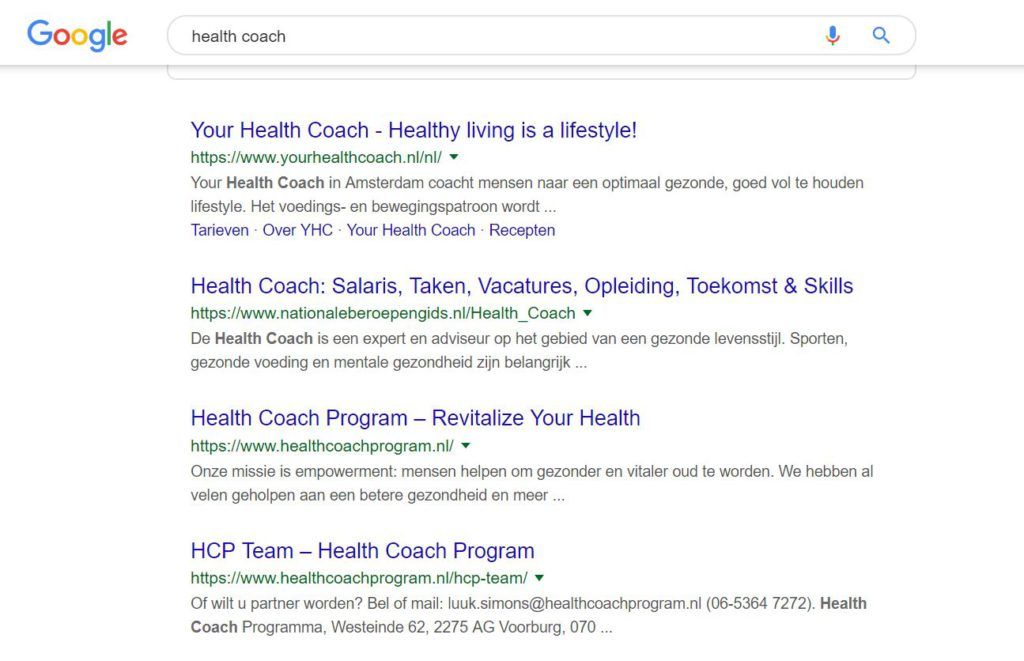It’s not an easy task.
And anyone who tells you that there is a shortcut to get thousands of visits is almost certainly lying.
But, let’s see what organic traffic is first.
Organic traffic is all those visitors that land on your website after searching on Google or any other search engine.
These visitors are precious because they are real people looking for information, a product or a specific type of service and your site has appeared in the results.
They are qualified leads since they already are interested in what you offer. They are the ones who have searched for your type of business in the first place.
For this reason, they will be closer to buying your product or hiring your service.
Every business needs organic traffic, the more the better, because the more visitors you receive, the more chances you have of selling more.
In addition, organic traffic attracts more traffic, as Google ranks sites that already have significant organic traffic higher and more frequently, creating a virtuous circle.
To see this more clearly, let’s look at what organic traffic is NOT.
The clicks you get to your website from paid ads on Facebook or AdWords aren’t organic traffic. And while these ads may provide immediate results, they’re not sustainable over time.
In other words, ads provide you with temporary traffic, but what happens when you stop paying?
That traffic disappears.
However, if you can increase your organic traffic, you will get more visits in a month, in a year and probably in 3 years if the content is good.
You should see the effort you put into increasing the organic traffic of your website as a mid-term investment.
Now let’s see how you can increase organic traffic.
It’s a slow and laborious process but it’s worth it.
Besides, is there any other way? Not really.
Shall we start?

Content is king
There’s no secret. To get a lot of traffic you need to write very good content using the right keywords.
And the first thing you need to know is who your potential customers are and what exactly they are looking for.
To find out, you need to research your ideal customers and what motivates them, you can use social media and current customers’ feedback.
Once you have a clear idea of who these prospects are, you must choose the right keywords and try to compete for them.
Competing here means that of all the websites that talk about the same subject as you, yours is the one that appears at the top of the results pages when a person types those keywords into the search engines.

For example, if you are a health coach it will be very difficult to compete for the keywords “health coach” because there are hundreds.
But you can choose a long keyword such as “health coach in The Hague” since there will be less competition.
This way you can better define your audience, by region or by type of customers.
Let’s look at an example by type of client.
“Health coach for burnout cases”
This is a keyword, or better, a long-tail keyword.
Your audience may perform this type of search, and if you specialise in burnout cases, you’ll have a better chance of appearing on search engines when that person is looking for help.
Here you need to know exactly what words your prospects are using to search for the type of service/product you offer, and you need to use these words in your website content.
But remember, it’s no longer a question of repeating these keywords over and over again on your home and service pages.
This worked many years ago, when the algorithms Google uses to analyse content were not as developed as they are now.
Let’s assume that Google is not stupid and that it wants people searching to find quality content that addresses their problems and interests.
So it’s all about creating a blog that talks about the topic your ideal customer is interested in and that adds value.
I recommend you read this post where I explain in more detail how to write quality content and how to create a content strategy that gets real results.
5 straight-forward ways of attracting organic traffic to your website. #ContentMarketing #SEO #DigitalMarketing Share on XConsistency
For your website to appear in search engines you must write great content on a regular basis.
Google is very fond of websites that publish frequent content and also update old posts.
By this I don’t mean that you should write something every day, whatever it is, as long as you publish very often.
As we have seen in the previous section quality is what should prevail.
So if you don’t have anything interesting to say, better say nothing.
It’s not about publishing because it’s Friday and you are determined to publish a post every Friday, but about publishing because you have something interesting to say to your target audience.
It’s true that consistency is rewarded, and that it’s better to publish every week.
However, if you’re very busy and you don’t have the time, or if you’ve decided to pay a content creator to take care of your blog and you can’t afford to pay for a weekly post, it’s better to publish twice a month, but to do it properly.
Google only shows quality results in the first search pages. In the end, Google wants to give excellent service to its customers, like any company.
For some reason, it has become The Search Engine and has overtaken others such as Yahoo or Bing.
Why do you think Google has managed this?
Because it offers very good search results.
Users quickly and easily find what they were looking for and get quality information.
That’s why you also have to offer quality and reserve time in your busy schedule to writing good content for your potential customers.
Web structure and speed
Another very important factor to take into account when increasing organic traffic is the structure of your website.
This must be very well organised so that Google bots* don’t get lost on your site and decide to quickly leave and go somewhere else.
*Bots are the technology that Google uses to crawl content. (The word bot comes from robot, since in reality they are artificial intelligence).
The web structure is the way in which the different sections of your site are organised.
The different sections of your website must follow a logical structure, without broken links or sections that don’t make any sense.
In this post I explain in more detail what web structure is.
The other very important factor when attracting organic traffic is your website speed.
If it takes too long to load, the visitors that land on your website will get impatient and leave, thus increasing the bounce rate.
Bouncing is one of the toughest enemies of organic traffic.
Bouncing occurs when a person clicks on your site and leaves immediately. This tells Google that your site has no interest and will decrease your ranking.
If a lot of people leave your website right away, Google will place it at the bottom of the queue.
So you want your site to load as fast as possible, because people are in a hurry and nobody is going to wait patiently for your site content to appear someday.
Any page that takes more than a second to load is in danger of bouncing.

Guest posts
A safe way to increase the organic traffic of your website is to write guest posts on other blogs in your field that have more authority than yours.
Authority here means that they are popular blogs and have more organic traffic than yours.
You should write one of your best posts for that blog, even if it hurts.
At first it can be disheartening to put huge amounts of research and writing efforts into getting that post to appear on a blog that’s not yours, but you need to realise that that post might be one of the best investments in time and effort you’ve made so far.
Because if that other blog has more traffic than yours, it will be more likely that people who read and enjoyed your post will later go to your website to get to know you better.
You may get several leads out of that post, so put all your energy into writing it.
How to ask nicely to be a guest on a blog
The best thing you can do when contacting this well-known blog is to explain very well the reasons why you want to write for them.
There are some blogs that don’t accept guests so the first thing you need to find out is if that blog collaborates with other people.
You don’t need to write the post beforehand when you’re just asking if you can collaborate.
The best thing to do is to study what they write about in that blog, who their readers are and what kind of posts work best.
Then you have to offer to write a post on a topic that they touch on their blog, but that they haven’t developed enough in their previous publications.
Or even a topic that you know will interest their audience but they haven’t touched yet.
Explain beforehand which keywords you will use and what kind of questions you will answer with that post.
Of course, you have to add a link to your website so they can see how you write.
Then wait and be prepared to receive some refusals. Although if you write very well and offer them a post on a topic that interests them, they will most likely say yes.
All that effort works and will pay off.
The last time I wrote a guest post, I immediately got a lead that I turned into a client and with whom I made around 2000 €.
So it was all worth it.
Recommended Reading Insider Tips to write an irresistible guest blog pitch
5 straight-forward ways of attracting organic traffic to your website. #ContentMarketing #SEO #DigitalMarketing Share on XLink Building
It’s about getting other blogs to mention yours because the information your share is valuable, and thus they cite you as a reference by adding a link to your website.
These type of links, let’s call them genuine, as opposed to paid ones, will provide you with more organic traffic and a better position in Google’s results.
Google thinks this way: if other respected blogs mention this blog it must be because it offers valuable content.
And therefore it will take your blog into account when showing search results to users.
It’s not easy to get other relevant blogs to mention yours, this only happens when you’ve been sharing well written, original and valuable content for a while, and thus other sites start to take you into account.
What you can also do to get more traffic, is that whenever you’re the one quoting another blog and adding a link as a reference, ask that blog to share your content.
This results in mutual benefit: you consider that other blog as a reference on a certain topic, which will provide them more authority in return; while sharing your post on their social media channels, that other blog will help you get more organic traffic.
Nice, right?
What you shouldn’t do
I’m sure you’ve read somewhere or you’ve been told that there are faster and easier ways to increase your organic traffic.
But what those people haven’t told you, because maybe they don’t even know it, is that there are practices that are counterproductive and can ruin all your work.
These practices can “annoy” Google and it might decide to punish your website by not showing it on the results page.
If you want to annoy Google, these are the ways to do it.
Copying content
As we said before, Google uses bots to crawl content. Bot is synonymous with robot, since that’s what they are, micro pieces of artificial intelligence.
In other words, these bots are intelligent and are able to think.
They are programmed to detect content that has been copied, so if they perceive that what you have done is to limit yourself to copying what others have done before, they will punish you by not showing your content.
Writing mediocre content
Writing for the sake of writing isn’t going to do you any good. Bots also realise that and they spy on Google users’ behaviour (i.e. three-quarters of the world’s population, including you and me).
In other words, they also check how long we stay on a page.
If the bounce rate we’ve seen before is too high they’ll consider the content isn’t any good, since people read the first sentence and leave right away because they’re not interested.
Being Inconsistent
Google (and especially your audience) likes consistent blogs. This means that it’s really important to plan an editorial calendar and stick to it.
It’s useless to write 2 posts a week for 3 months and then after that not writing anything for weeks.
Set yourself realistic goals.
Be honest with yourself and carefully consider how many posts you have time to write per month, or how much you can pay to someone to write them, and commit to that goal.
It’s better to write 2 posts a month and publish them in the same time interval, than to publish 2 posts a week and realise after a few days that you can’t keep up with that pace.
It’s all a matter of being honest with ourselves and consistent.
Buying suspicious links
As we have already seen Mr. Google is very smart and has under its radar those sites that are dedicated only to the paid link business.
These are sites in which the content is written only to promote certain websites that have previously paid.
There are some professional sites dedicated to paid links that may work well for a while but in the long run Google realises that they are not, let’s say, reliable sites.
Instead of paying for links to these sites, if you don’t have time or don’t like writing, invest that money hiring a content creator to write for you.
5 straight-forward ways of attracting organic traffic to your website. #ContentMarketing #SEO #DigitalMarketing Share on XConclusion
There’s no big secret.
If you want to increase the organic traffic to your website, you need to invest time, in the case you are the one who writes your website content, or money, in case you rather hire a person who writes for you.
Here there are no shortcuts, and results will not come in a week. It’s a consistent process that can take more than a year.
There are millions of blogs in the world, specifically about 440 million.
This figure is dizzying, isn’t it?
But if you think about it, there are a lot of dormant blogs.
Businesses or professionals who have started them, but abandoned them after a short while. You’ll find many with 4 posts written years ago and then nothing else.
Because as we just have seen, this is a long-term investment, and there are businesses that simply don’t take it seriously.
So they prefer to pay for ads on social media or Google, instead of investing in something lasting and more solid, which is a better content strategy.
As we have seen in some of my previous posts, people no longer buy a product or hire a service because they just like it or believe it’s what they need, but because they trust the brand behind that product.
When you share quality content that adds value to your target audience you are building a relationship of trust with those potential customers.
And guess who they’re going to choose when they’re ready to buy.
Exactly.
So get to work and dedicate resources to your blog.
5 straight-forward ways of attracting organic traffic to your website. #ContentMarketing #SEO #DigitalMarketing Share on XImage by mohamed Hassan from Pixabay



0 Comments